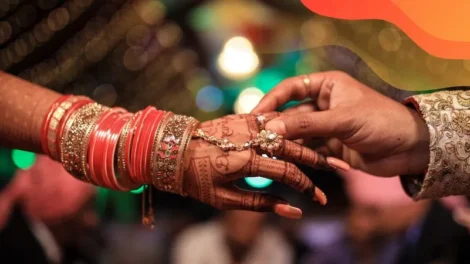For centuries, individuals have questioned – “Is a Man Incomplete Without a Woman”. It discusses gender roles, society, and personal ideas. To completely comprehend and study this topic, you must examine the many perspectives and variables that contribute to it.

Traditionally, men are powerful and independent while women are loving and supportive. This shows that a male may feel incomplete without a woman to provide emotional support, companionship, and social expectations.
It’s important to note that certain gender norms are no longer relevant in today’s culture. With shifting attitudes toward gender equality and the acknowledgement of varied relationships and lives, the idea of completeness being dependent on another person’s presence may be outmoded or detrimental.
Table of Contents
Personal ideas and experiences also shape one’s feeling of completeness. Some people find happiness in love relationships, while others value personal growth, career success, or hobbies.
In this section, we’ll look at the question, “Is a man incomplete without a woman?” from different points of view. Cultural effects, psychological factors, societal expectations, and alternative perspectives that question traditional relationship completeness will be considered. We hope to inform a debate on this complex subject by analyzing these angles.
Historical Perspectives on Masculinity and Femininity
Gender complementarity is a recurring issue in masculinity and femininity studies. This idea holds that men and women need each other to complete themselves.
Cultural, religious, and societal standards have supported this. Ancient myths and tales depicted male deities with female equivalents to symbolize the balance of masculine and feminine energy.
In traditional communities, men were guardians and providers while women were caregivers. Traditional attitudes held that a man’s self-worth depended on his ability to attract and keep a woman.
However, these historical views on masculinity and gender do not apply to all civilizations. Social progress, feminist movements, and gender equality have changed gender roles throughout ages.
Modern society accepts diverse masculine and feminine expressions. As people challenge gender conventions, the idea that a man is incomplete without a woman is being challenged.
This topic must be discussed with care and respect for varied perspectives, taking into account both historical contexts and current gender dynamics in society.
The Importance of Emotional Support
Emotional support is important to consider. “Is a man incomplete without a woman?” implies a gender dynamic, although everyone needs emotional support.
Mental health and well-being depend on emotional support. It needs someone to console, empathize, and understand at difficult times. Friends, family, lovers, and therapists can provide this support.
Emotional assistance aids life’s challenges. It reassures us that we are not alone. It lets us express our emotions without judgment or rejection.
Healthy relationships can boost emotional well-being, but one’s self-worth doesn’t depend on another. Get and give emotional assistance.
Finally, emotional support is crucial. Supportive relationships are important for mental health and happiness.
The Role of Partnership in Personal Development
Partnerships, especially those between a man and a woman, can have a big impact on how people grow and change. Even though “Is a man incomplete without a woman?” is a question that can be answered in different ways, it is important to remember that healthy relationships and partnerships can help people grow and feel more complete.
Partnerships offer support, companionship, and shared experiences. They offer emotional support, encouragement, and motivation to achieve goals. Open communication and understanding can challenge partners to grow academically, emotionally, and spiritually.
Partners learn from each other’s talents and flaws. They can improve each other’s weaknesses. Partnerships teach compromise, negotiation, empathy, adaptation, patience, and communication.
Personal development should not depend primarily on external forces or relationships. Each person’s growth is unique. Self-awareness, self-reflection, and personal growth are necessary regardless of relationship status, but collaborations can help.
Being “incomplete” without a companion is subjective. Relationships affect personal development. Each person must decide what helps them grow while acknowledging the support and growth that strong partnerships may offer.
Examining the Role of Women in Men’s Lives
Women’s position in men’s lives is often contested. While it is vital to understand that individuals have unique experiences and viewpoints, women can have a tremendous impact on men.
It’s believed that men need women. Women provide emotional support, companionship, and personal growth. Women can help males express their feelings, overcome obstacles, and acquire emotional intelligence.
Men need companionship too. Women’s viewpoints and genuine ties balance partnerships. Women improve social interactions, deepen relationships, and offer personal growth.
Women also influence men’s growth. Men can expand their perspectives by interacting with women. Women can urge men to try new things, learn, and be empathetic.
These are generalizations, so your experience may differ. Women’s participation in men’s lives should be considered a chance for progress rather than an obligation. Personality, culture, and preferences determine interpersonal dynamics.
The Importance of Independence and Self-Fulfillment
Self-sufficiency and personal fulfillment require independence and distinctiveness. The idea that men need women is outmoded and confining. Each person has strengths, objectives, and desires that define them.
Self-sufficiency aids personal growth. It empowers people by letting them meet their own emotional, financial, and physical requirements. Independence helps people handle life’s problems and make decisions that reflect their values and ambitions.
Accepting one’s uniqueness also brings personal fulfillment. We prosper by embracing our unique traits, hobbies, and opinions. We can find true fulfillment when we put ourselves first without relying on others.
Relationships can improve our lives, but pleasure comes from within. We build lasting relationships based on mutual respect, support, and shared experiences rather than dependency or insufficiency by respecting independence and cultivating our own self-fulfillment journey.
In conclusion, freedom and self-fulfillment help people accept their individuality. Self-sufficiency and personal progress foster empowerment and mutual respect in relationships.
Navigating Gender Equality and Power Dynamics
Healthy partnerships require navigating gender equality and power issues. “Is a man incomplete without a woman?” promotes gender norms and unequal power dynamics in relationships.
Today’s society must confront these antiquated attitudes and seek true relationship equality. Everyone has unique abilities and qualities, regardless of gender.
Society, culture, and personal experiences can affect interpersonal power dynamics. To achieve equality, power disparities must be addressed.
Communication, respect, and collaborative decision-making promote equality. Both spouses should freely express their wants, desires, and perspectives.
We may build healthier relationships based on respect, understanding, and shared responsibility by actively questioning gender roles and promoting power equality.
Breaking Stereotypes: Redefining Masculinity and Femininity
Masculinity and femininity have developed, challenging preconceptions and altering social standards. Stereotypes say men are incomplete without women. However, this idea reinforces detrimental gender stereotypes and prevents people from being themselves.
Today, we know that one’s worth and identity are independent of their relationship status or that of other people. Men can be happy and confident without romantic partners. It is vital to reject the assumption that a man requires a woman to feel complete, as this weakens individual liberty and supports antiquated gender norms.
By confronting these assumptions, we allow men to explore their emotions, vulnerabilities, and different interests without criticism or social pressure. Men can build stronger relationships based on respect, equality, and emotional well-being by adopting a more inclusive understanding of masculinity.
It’s crucial to enable men and women to express themselves freely without gender stereotypes. We can establish a society that values people for who they are rather than their roles in others by promoting inclusivity and understanding.
Conclusion: The Complexity of Human Relationships and Personal Fulfillment
The idea that “Is a man incomplete without a woman?” oversimplifies human relationships and personal fulfillment. Personal fulfillment and pleasure differ from person to person.
Romantic connections can boost one’s happiness, but there are other ways to grow and be happy. Friendships, family, a job, creativity, self-discovery, and personal growth can bring fulfillment.
Reducing personal contentment to the presence or absence of a love partner simplifies the complexity of human relationships and devalues other vital parts of life. It’s important to accept that everyone’s route to happiness is different.
Self-acceptance, self-awareness, and pursuing values-based goals bring personal fulfillment. Companionship is nourishing, but it doesn’t make someone whole or happy.








[…] Supporting and building connections with single dads requires understanding their role. Knowing what a single dad wants in a woman might strengthen a relationship. […]
[…] women relate to work-life balance. It is complex and requires tough choices. Working moms start with maternity leave and return to […]